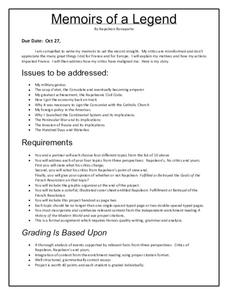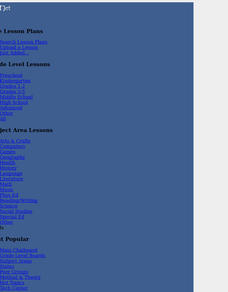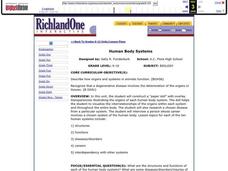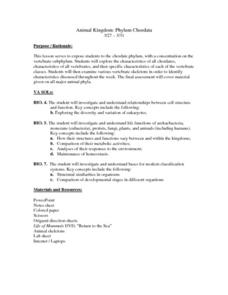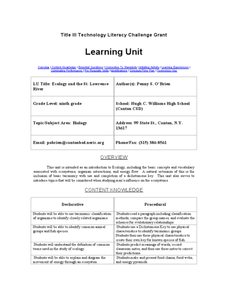Beverly Hills High School
Memoirs of a Legend
To conclude a study of the French Revolution, young historians adopt the voice of critics of Napoleon Bonaparte and lay charges against him. They then craft a memoir in Napoleon's voice that details his motives and what he sees as his...
Curated OER
How Can Plants Be Grouped?
In this plant classification instructional activity, students compare plants with flowers and plants with cones by filling in the blank of 7 statements.
Curated OER
What Kind of Insect is That?
Fifth graders characterize insects and classify insects according to the Linnaean system. They use hand lenses or microscopes to examine insect body parts.
Curated OER
The Living Environment
Ninth graders compare and contrast animals according to their four systems. In this living environment instructional activity students complete their assignment on the animal they were given and present their findings to the class.
Curated OER
Bioluminescent Bewilderment!
Ninth graders investigate the concept of bioluminescent. They break down the word phonetically for correct pronunciation. This is done as a warm up for learning. Then students create a list of the creatures from prior knowledge and...
Curated OER
This Place is Going to the Dogs
Students study different breeds of dogs. They watch a video, "Extraordinary Dogs", about special dogs and how they are categorized according to their adaptations. Then they create a digital video that demonstrates the qualities of dogs...
Curated OER
Scientific Inquiry
Middle schoolers make inferences about what activities occur at different places in school. They form a hypothesis as to how space is used. They simulate how archeaologists explore past people by designing and conducting a research project.
Curated OER
Human Body Systems
Students explore the systems that comprise the human body. In this human physiology instructional activity, students create a model of the human body and research a disease from a particular system. Students will then choose to either...
Curated OER
"Bug Hunt"
Fourth graders find bugs represented on a grid and then identify their name and physical characteristics that provide a picture of the bug using imagery.
Curated OER
Classifying Rocks
Students classify rocks into groups after they observe the rocks and identify properties that can be used to divide them into groups. They then identify other properties that could be used to classify other objects into groups.
Curated OER
Variation
Students practice sorting living things into groups using their characteristics. Using pictures of leaves and animals, they sort them based on their color and shape and write the objects characteristics under the picture. They share...
Curated OER
Grouping and Changing Materials
Students feel and observe different types of materials. Using the internet, they sort objects based on the materials they are made from and justify their reasons for putting it in a certain category. They identify objects that could...
Curated OER
Gallery Walk Questions about Energy and Material Cycles
Students state the physical, chemical or biological processes associated with these environments: Pelagic ocean zone, California coat Cave, Indiana Barrier island beach, North Carolina Sand dune, Dunes National Park, Colorado Wetland and...
Curated OER
The Game of Life
Students explore the game of life which refers to what happens to a species when most of the population is gone. In this endangered species activity, students describe what it means for a marine animal to be endangered. Students then...
Curated OER
Super Scientists Code
In this science learning exercise, students use the key code on the right to unscramble each of the scientists. They also match each of the scientists found to their correct description.
Curated OER
Relationships and Biodiversity Lab Practice
In this biodiversity worksheet, students determine the relationship and complete the evolutionary tree for the plants listed. Students review genetic code and DNA sequencing. This worksheet has 1 graphic organizer, 8 multiple choice, and...
Curated OER
Classify Machines that Fly!
Eighth graders explore flight and the dichotomous key. In this flight lesson, 8th graders gain understanding of the dichotomous key and create one of their own. Students then use their dichotomous key to classify types of aircraft.
Curated OER
Animal Kingdom: Phylum Chordata
Learners use a dichotomous key to classify various vertebrate jar speciments into classes. They examine the speciments for general characteristics of each class and fill in a corresponding chart and then complete a few final assessment...
Curated OER
Mussel Identification Activity
Students identify given species of animals, such as various
mussels, by sets of physical characteristics as they use a key. They also read about mussels on the Illinois River and look at mussel species in the online database. Finally,...
Curated OER
What is life? Word Search
In this biology activity, students locate and identify various vocabulary terms related to life biology. There are 48 words located in the puzzle.
Curated OER
Keys and Classifying
Young scholars classify plants and animals. In this organisms lesson, students define classification and sort various objects according to its attributes. Young scholars then research wildlife of Utah and group the organisms into...
Curated OER
Ecology and the St. Lawrence River
Ninth graders complete a unit of lessons on ecosystems, organism interactions, and energy flow. They create a key for known species of fish, diagram the movement of energy through an ecosystem, and create and present food chains and food...
Curated OER
Classifying Polygons
Students study polygons. In this math lesson, students play a game in which they learn the classification system for polygons. Students identify the properties of quadrilaterals.


